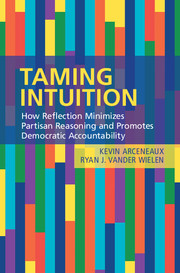Book contents
- Frontmatter
- Contents
- List of Figures
- List of Tables
- Preface and Acknowledgments
- 1 Democratic Accountability and the “Rational” Citizen
- 2 A Theory of Individual Differences in Reflection and the Intuitionist Model of Political Reasoning
- 3 Measuring Individual Differences in Reflection
- 4 Toeing the Line: Partisan Identities and Policy Attitudes
- 5 Throwing the Rascals Out: Partisan Identities and Political Evaluations
- 6 Can't We Disagree without Being Disagreeable? The Role of Reflection in a Polarized Polity
- 7 Reflections on the Role of Reflection in Democracies
- Appendix Details of Empirical Studies and Statistical Analyses\
- Notes
- References
- Index
5 - Throwing the Rascals Out: Partisan Identities and Political Evaluations
Published online by Cambridge University Press: 30 August 2017
- Frontmatter
- Contents
- List of Figures
- List of Tables
- Preface and Acknowledgments
- 1 Democratic Accountability and the “Rational” Citizen
- 2 A Theory of Individual Differences in Reflection and the Intuitionist Model of Political Reasoning
- 3 Measuring Individual Differences in Reflection
- 4 Toeing the Line: Partisan Identities and Policy Attitudes
- 5 Throwing the Rascals Out: Partisan Identities and Political Evaluations
- 6 Can't We Disagree without Being Disagreeable? The Role of Reflection in a Polarized Polity
- 7 Reflections on the Role of Reflection in Democracies
- Appendix Details of Empirical Studies and Statistical Analyses\
- Notes
- References
- Index
Summary
Although no longer a household name, AlbenWilliam Barkley enjoyed an accomplished political career.He began as an elected county prosecutor in Kentucky at the age of 29. Six years later he was elected to the US House of Representatives. After seven terms, he was elected to the US Senate, where he would go on to serve in the leadership, and in 1948 he was chosen to be President Truman's running mate and subsequently served as the nation's thirty-fifth vice president. Barkley was fond of telling a story in his campaign stump speeches about a farmer who lived in the county where his political career began. The farmer had long been a loyal supporter, so Barkley was surprised to learn that he was thinking of voting for his opponent in an upcoming election and called on him.He reminded the man of all of the things he had done for him as a county prosecutor, representative, and senator. It was a mighty long list, and after reciting it, Barkley implored, “How can you think of voting for my opponent? Surely, you remember all of the things I have done for you.” The farmer replied, “Yeah, I remembered. But what the hell have you done for me lately?” (Barkley, 1954, 165).
Barkley's story speaks to the heart of what democratic accountability is all about at the level of the individual voter. Elections give individual voters the opportunity to punish incumbent politicians when they behave like rascals. There are two avenues by which people can accomplish this task. The first involves choosing the candidate offering to enact policies that fall closest to the voter's ideological position on the left/right continuum (Downs, 1957; Kramer, 1977; McKelvey, 1975). We have already discussed a significant obstacle in this pathway. For many voters, their ideological “preferences” are endogenous to their partisan loyalties, which gives politicians from their party leeway to take positions that they prefer even at the expense of their constituents. In addition to the problem of endogenous preferences, Ferejohn (1986) offers another downside to issue-based voting. Even if we assume the best-case scenario – people have coherent ideological preferences and partisan identities are inconsequential – the fact that incumbents must reveal their policy positions in office means that challengers can always offer a set of policy positions that defeat the incumbent.
- Type
- Chapter
- Information
- Taming IntuitionHow Reflection Minimizes Partisan Reasoning and Promotes Democratic Accountability, pp. 113 - 134Publisher: Cambridge University PressPrint publication year: 2017



